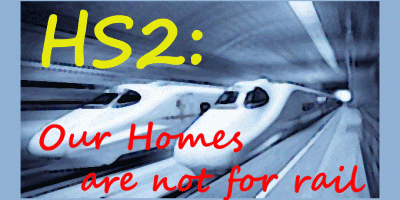Keri Brennan of Hillingdon Against HS2 writes on the impacts of High Speed Rail on London.
 You may or may not have heard about something called “HS2” – but what exactly is that?
You may or may not have heard about something called “HS2” – but what exactly is that?
It’s a proposal to build a high speed railway (High Speed Two) from London to the regions, with the first phase running to Birmingham. Later stages would connect to Heathrow Airport as well as Manchester and Leeds. Eventually, the network could extend to Scotland and connect with the existing high speed rail link to Europe.
The reasons are many – reducing domestic flights, reducing pressure on motorways, the environmental benefits of both of those, the business benefits of time savings, transferring wealth to the north, and providing much needed extra capacity on the rail network. It sounds like a great idea, doesn’t it?
Well it did – until experts, academics, environmentalists, experienced and well qualified citizens, and some inquisitive MPs (yes there are still some) started looking at it more closely. And actually it has become clear that of all the claimed benefits listed above, none really hold water except for the capacity argument – and that’s only because it would provide far more capacity than is necessary. Even environmental groups – natural allies of rail transport over air – are unsupportive of this particular proposal called HS2.
Against the widespread and increasingly well informed opposition, its supporters still argue that the huge cost – approaching £40bn – will be worth it, and that London will reap huge benefits. So is that a believable claim and should Londoners support it?
Does London benefit?
So what would HS2 really mean for Londoners? For a start, the huge cost would inevitably mean less money for other things (an opportunity cost). Think of it this way: when your children are being forced into overcrowded portakabins at school, that’s government money being saved towards HS2. When your local hospital is closed or services moved further away, that’s government money being saved towards HS2. When your council starts cutting jobs and services, that’s government money being saved towards HS2.
In fact almost every government pot of money you can think of will inevitably be affected by HS2. And who will pay for it? You will of course – not only through your taxes but sneakily through additional local government surcharges in the same way as the London Olympics and Crossrail will be paid for.
Meanwhile, the really most crowded parts of the London transport network – Paddington, Waterloo, the tube network, the roads – would inevitably drop down the list for investment. And the disruption caused to Euston would last for many years. Of course that impact hasn’t been costed, nor has the impact of any other disruption such as the likelihood of delays on the important A40 western route into London.
That is all future problems but for thousands of Londoners already there are problems now. The shoddy way that local communities in the boroughs of Camden, Brent, Ealing, Hammersmith and Fulham, Ealing and Hillingdon, have been treated so far should alarm ordinary people. The fear of being uprooted from your family and community is dreadful enough, whether you’re a pensioner who’s lived there for decades or a young family whose children access local schools and have local friendships. But that terror is magnified by the government’s reluctance to prepare suitable and fair compensation packages for home owners or council tenants.
Would you believe that many concerned families – unfairly called “nimbys” by the government – have even been threatened with the proposed railway being built quite literally through their back garden, just metres from homes, without even the promise of any sound insulation. Quite incredible, but completely true. Even now, the government has again postponed a consultation about appropriate compensation – whilst at the same time going full steam ahead employing consultants on salaries of £100k plus. The vast majority of Londoners will find such enormous salaries astonishing. Clearly this HS2 is not just a fast train but a gravy train too.
If a high speed rail network really is needed, what’s been cobbled together behind closed doors is – even to many supporters of high speed rail in principle – the most environmentally damaging, the most economically inefficient, and the least integrated solution, bringing benefits only to a few vested interests.
If HS2 is the answer, the question must have been a very stupid one.



0 Comments
You can be the first one to leave a comment.